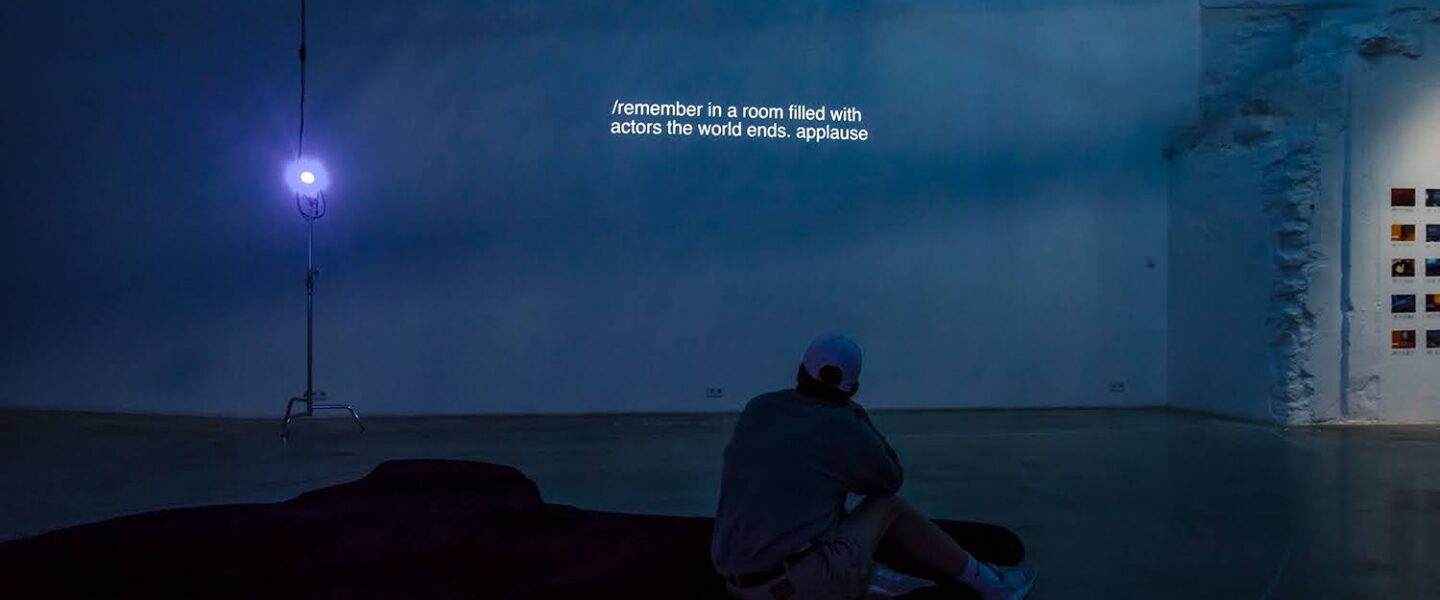
Exhibition "Held in Human", exhibition by Taavet Jansen and Liis Vares, EKA Gallery, 2023
EKA, A101
Start Date:
19.04.2024
Start Time:
16:00
End Date:
19.04.2024
We invite you to a panel discussion inspired by the article “From Past to Present: The Journey of Technological Theatre” by R. Kelomees, T. Jansen, and P. Hoppu. The article discusses how technological innovation has been essential in developing theater and the visual arts since the “beginning of time.” Moderated by digital theater researcher Katie Hawthorne, the event promises to be an engaging discussion about the potential and shortcomings of digital technologies in the contemporary world and how this might affect theater and contemporary art more extensively. A moderated panel discussion will follow short presentations by Raivo Kelomees, Taavet Jansen and Liina Keevallik.
This mini-conference is part of the project Acute, Culture Testbeds for Performing Arts and New Technology, which focuses on the development of performing arts and new technologies and is also part of the satellite program of the New European Bauhaus Festival. Together, we will rethink the role of theater and art in our shared space, discuss how technology and art can connect people in these challenging times, and question the important issues that surround us.
The event take place at Estonian Academy of Arts on April 19th at 4pm(EET), room A101 and will be livestreamed in EKA Youtube.
Link: https://www.youtube.com/watch?v=4EYJ93CEUaw
SPEAKERS
Taavet Jansen is an artist and researcher at the intersection of performing arts and technology. He has a rich background in theatre, creative coding, digital arts, and teaching. Taavet studied at Tallinn University and completed a Master’s in Choreography and New Media at the Theater School in Amsterdam. He is a doctoral student at the Estonian Academy of Arts in Art and Design and a multimedia lecturer at the University of Tartu Viljandi Cultural Academy. In recent years, Taavet has focused on digitally mediated performance art as a researcher and creator. He is one of the founders of the interdisciplinary art platform e⁻lektron and the technological art network MIMproject. As a researcher, he has been involved as PI in research projects such as “INDEX—Reconnecting the digital audience with the creative team in the online events” and “Online theatre as a research tool,” both of which focus on online theatre through the development of interaction tools that allow real-time audience feedback. His creative work spans a range of theatrical performances, installations, and media design projects where he has been blending his artistic expression with technological innovations. Recent works include “Held in Human,” “Memento,” and “Wolves,” all of which explore interactive digital performances. Taavet’s academic publications explore the confluence of technology and the performing arts, underscoring his commitment to advancing the field through research and interdisciplinary collaboration. Taavet Jansen’s career embodies a dedication to enhancing the performing arts through technological innovation and research to understand and improve audience engagement in digital spaces.
Raivo Kelomees, PhD (art history), is an artist, art historian and new media researcher. He
studied psychology, art history and design in Tartu University and the Academy of Arts in
Tallinn. He is senior researcher at the Fine Arts Faculty at the Estonian Academy of Arts and
professor at the Pallas University of Applied Sciences. Kelomees is author of Surrealism
(Kunst Publishers, 1993) and article collections Screen as a Membrane (Tartu Art College
proceedings, 2007) and Social Games in Art Space (EAA, 2013). His doctoral thesis is
Postmateriality in Art. Indeterministic Art Practices and Non-Material Art (Dissertationes
Academiae Artium Estoniae 3, 2009). Together with Chris Hales he edited the collection of
articles Constructing Narrative in Interactive Documentaries (Cambridge Scholars
Publishing, 2014). In collaboration with Varvara Guljajeva and Oliver Laas he edited the
collection of articles The Meaning of Creativity in the Age of AI (EKA Press, 2022).
Katie Hawthorne is a researcher based in Scotland. She is an alumna of the Academy for Theatre and Digitality’s fellowship programme and became a member of staff at the Academy in 2022, with a role focussed on the documentation and dissemination of research. Katie is the author of the first cross-European study Digital Theatre: Digital Strategies and Business Models in European Theatre (2023), commissioned by the European Theatre Convention and first presented at the European Theatre Forum in Opole, Poland. The study drew on her Ph.D research, completed at the University of Edinburgh in 2022, which explored how ‘liveness’ in theatre and performance is evolving through the use of digital tools and technologies. She has given papers at a host of international conferences and institutions, including the IFTR in Shanghai and TaPRA in Exeter, and authored a chapter on the Berliner Theatertreffen in the Edinburgh German Yearbook in 2021. Katie is also an accomplished freelance journalist, and regularly contributes to publications including The Guardian and The Scotsman.
Liina Keevallik, PhD, has studied scenography at Estonian Academy of Arts and holds a PhD from the University Paris 8. She has done set and costume designs in Estonian theatres as well as abroad (France, Belgium, Spain, Norway, Lithuania), her works ranging from big operas to underground avant-garde. She has also written and directed visual performances. Her latest creations merging art and scientific research are Cloud Opera (2019), juxtaposing data clouds and atmospheric clouds; and It’s Time to Fight Reality Once More. Sentimental Education for Robots (2021), a play written by AI, performed and improvised by robots. She has also designed feature and puppet films and directed short films and documentaries; written texts for theatre, song lyrics and film scripts. She currently works as a freelance scenographer in Paris and Tallinn, pursues her research at BFM (University of Tallinn) and teaches scenography at Estonian Academy of Arts. She has participated in the international media archaeological research project Deceptive Arts (Les Arts Trompeurs); an artistic research project collaborating with AI Machine Acts and she has created the pre-cinema department of the Estonian Film Museum.

